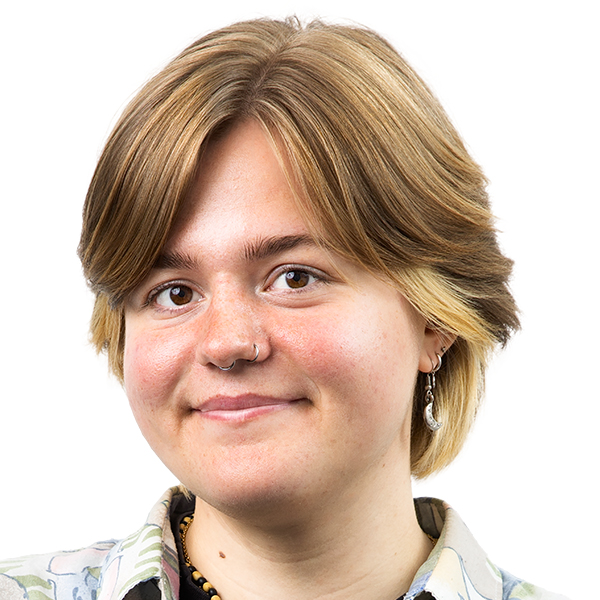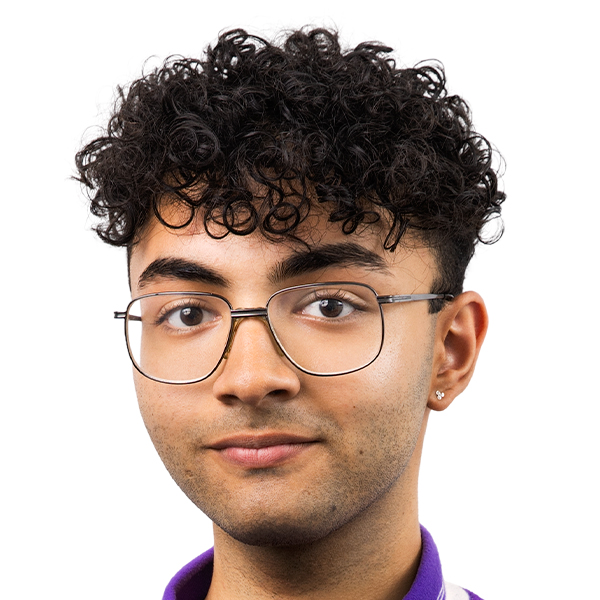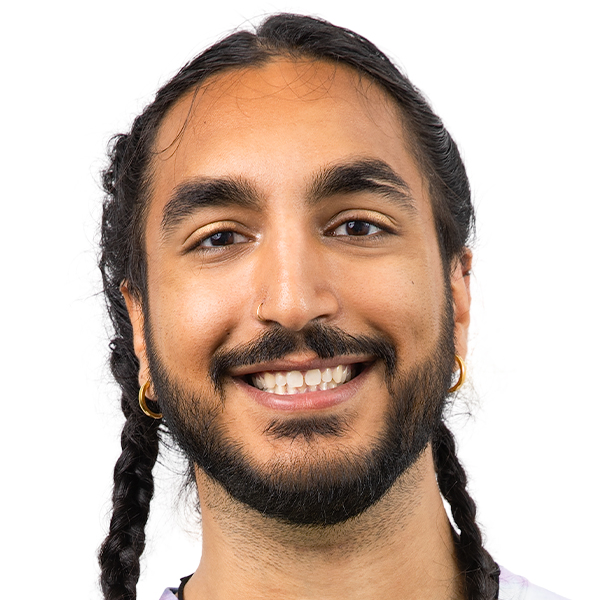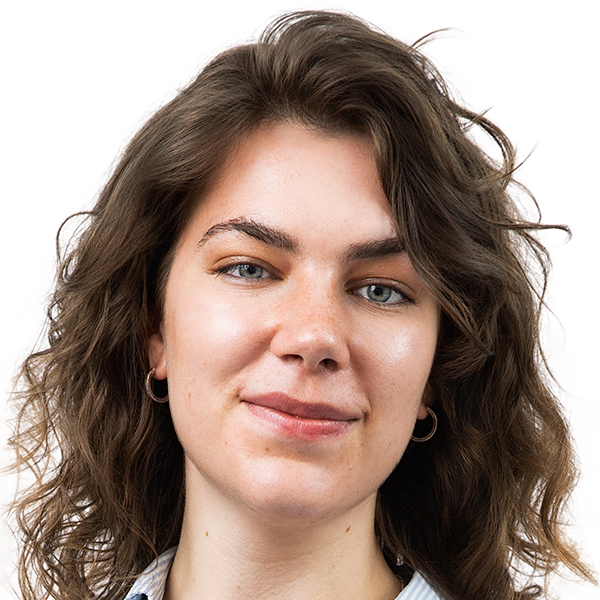Each year, six representatives are voted in by the student body to advocate for changes and improvements to the campus experience.
Selected individuals take a year out of their studies to work full time at EUSA (the Edinburgh University Students’ Association) where they have regular meetings with the university’s senior leadership team while sitting on on the EUSA trustee board, influencing decisions at both the university and student union level.
Each position covers a number of topics, including university finances, decolonisation of the curriculum, access to housing and transport, study spaces and extracurricular activities.
We sat down with each of the new officers to hear about their plans for the year, what they hope to achieve, and why they wanted to take on the responsibility.
Ash Scholz – President

Ash leads the student representative team while also focussing on issues affecting students nationally, the university’s finances, as well as working on divestment within the university.
They told us that they wanted to run for EUSA presidency because its the students who “make the university what it is”, through community building and outreach events like “mutual aid fundraisers, cultural events, ceilidhs, movie nights, or sports”.
They told us that activists across campus have inspired them massively, praising the work of Sex? On Campus!, a grassroots campaign against gender-based violence which Ash helped to set up, as well as the work of trans activists on campus.
Ash continued: “We are a university of campaigners, socials organisers, breakdown-havers, artists, writers, athletes, peer group leaders, community builders, mountain climbers (figuratively and literally), last-minute-assignment-completers, and in-change-believers.
“And for too long, the feeling on campus has been one that students haven’t been prioritised in decisions being made by the university, on issues like divestment, increasing rent in student accommodation, or overpriced cafes. And I ran to change that.”
They identified three areas they most wanted to change: The student voice – ensuring that studetns are involved in “every single level of decision making”, strategic change – working to align the university’s financial and divestment policies with the demands of students, and making students’ lives easier – lobbying even beyond the university to campaign for fairer and better deals for students in Scottish Government policy, including the Housing Bill and campaigning for free bus transport for all students, not just those under-22.
These areas have been inspired by their own experiences, telling us that their time working three jobs just to survive in Edinburgh and how this inspired them to lobby for rent controls on student accomodation, better guarantor scheme’s, and free bus travel.
Additionally, they said: “The rise of the far right is massively worrying me, especially the anti-immigration rhetoric and decisions in Westminster, which will affect international students drastically.
“But also, the anti-trans discourse and the Supreme Court ruling, and the issues facing the trans community at the moment. I don’t think there is an easy way to tackle this, but we need a strong student movement to stand strongly for openness and acceptance, rather than hate.
“And we are doing what we can, like lobbying the Westminster government for more options for international students, and offering spaces for our communities to be safe in.
Beyond their role, Ash told us that they’re a “massive nerd”, and that they’re always on the lookout for the best coffee in Edinburgh.
Akrit Ghimire – Vice President, Community

Akrit has spent a year as the undergrad rep for Informatics, getting a taste of student representation that he wanted to explore further. His priorities lie in diversity, student life, and ensuring there are affordable food options available on campus.
He hopes to find ways to make more affordable options available within the university and students’ association, while also organising cooking classes to help students meal prep and save both time and money while making nutritional meals.
He also wants to promote diversity and inclusion on campus, advocating for student artworks to be put up across campus and working with focus groups to decolonise the curriculum. He shares Ash’s focus on affordable housing and the expansion of free bus travel.
When asked what the biggest challenge students are facing on campus right now, he said: “I believe it is the impacts that financial cuts to the university, college and schools will have to student experience across the university.
“Working with the Sabbaticals we are going to bring issues around this forward in meetings with university staff and be there for students and student groups to hear their concerns and help escalate them to the right people.”
John Rappa – Vice President, Activities & Services

John ran for vice presidency to make a difference, after struggling financially and with their mental health, they made it a priority to support students in the same boat – working to provide free breakfast clubs for all students once a week.
Like the rest of the sabb team, John said they want to make campus more inclusive, advocating for the safety and rights of international students “during a period of heightened anti-immigrant hostility”, while also “creating accessible and fun opportunities for students to find community”.
This is a central pillar of their aim for the next year, saying: “I think students are struggling to connect with each other in cheap and meaningful ways.
“My solution is simple and elegant – I want a weekly free breakfast where all students can come together, where they don’t need to come in any particular way nor pay – they can just eat and chill.
“It’s a regular chance to chat with peers from your courses who you may never have spoken to before, it’s a good time to hang out with friends in the morning and get a good start to the day, and it’s free food.”
Syjil Ramjuthan – Vice President, Welfare

Syjil has chosen to focus on social justice, already having been influential on campus through her pevious work with the Feminist Society and as EUSA’s Women’s Liberation Officer.
When asked what her key missions are for the year, she told us about the importance of tackling Gender-Based Violence on campus through a fairer conduct policy and consent training, as well as improvoemnts she hopes to make to the experience of widening participation students, trans people and students who have been displaced from violent conflict.
She also cited the ongoing cost of living crisis as one of the biggest issues facing students in Edinburgh, saying that the financial pressures EUSA and the university are under is having an impact on the other areas of activism she hopes to advance upon, but that even with a few compromises she is pushing ahead with as many of the support services as possible.
This commitment to hard work, even under difficult circumstances, she credits to her role model, her mum, who raised Syjil in Apartheid South Africa, fighting through personal, economic and systematic hardships to advance her education and work in public health. This experience of growing up and witnessing both injustice at almost every level, but also resilience and determination to break boundaires, has fuelled Syjil’s drive in creating positive change.
Katya Amott – Vice President, Education

Wanting to make things better for those who come next was Katya’s ambition for running to be VP for Education. To do this, she turned her focus to the attainment gap – a topic she had little knowledge of before she got her position, but quickly got to grips with by taking in the data from various studies about the various barriers faced by Scottish, widening participation, and BAME students on campus.
Asked what the biggest issue facing students is, she said: “Money, or the lack thereof. Year on year, students have less and less money. Most of us spend winters in cold flats, dealing with damp and mould, because the cost of keeping a flat warm is simply too high.”
To combat this, Katya is calling for changes within and beyond the university, like opening more university ran paid internships, reforming tenants’ rights and a reduction in the pressure for young people to complete unpaid work to get a foot up in their future career.
As a third culture kid from Australia, she was inspired by Julia Gillard, the first female Prime Minister for Australia who was voted in during her childhood. After moving to Aberdeenshire at 11, she struggled with her identity and lost the sense of belonging she had in Australia, but her admiration for Julia Gillard’s strength and resilience, even during a “rocky few years” in government taught her what she needed to know about pushing on through adversity.
